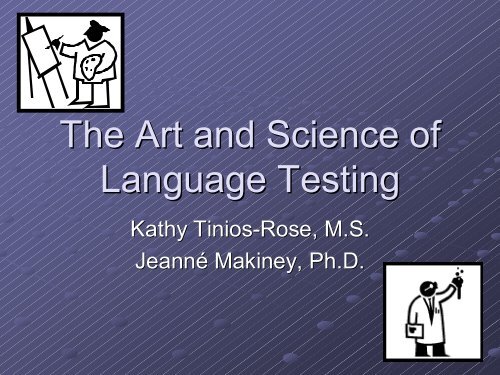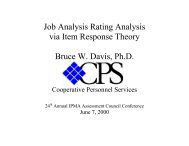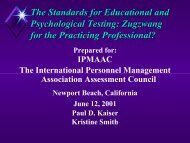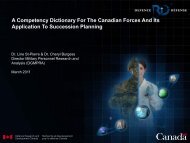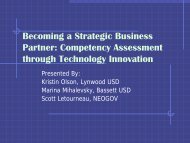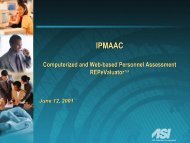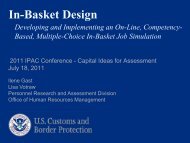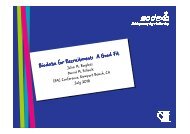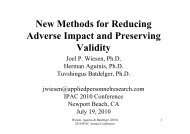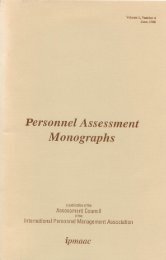The Art and Science of Language Testing - IPAC
The Art and Science of Language Testing - IPAC
The Art and Science of Language Testing - IPAC
You also want an ePaper? Increase the reach of your titles
YUMPU automatically turns print PDFs into web optimized ePapers that Google loves.
<strong>The</strong> <strong>Art</strong> <strong>and</strong> <strong>Science</strong> <strong>of</strong><br />
<strong>Language</strong> <strong>Testing</strong><br />
Kathy Tinios-Rose, M.S.<br />
Jeanné Makiney, Ph.D.
Overview<br />
Getting to know you . . .<br />
<strong>Language</strong> Pr<strong>of</strong>iciency <strong>and</strong> Interpreting Skill<br />
Employment vs. Certification<br />
Test Types<br />
<strong>Language</strong> S<strong>of</strong>tware<br />
Cultural Norms<br />
Scoring<br />
C<strong>and</strong>idate Feedback<br />
Test Security
How can we help you<br />
What experiences have you had with<br />
language testing<br />
What are your language testing needs<br />
What information do you want to take<br />
with you after leaving this tutorial
<strong>Language</strong> Pr<strong>of</strong>iciency<br />
C<strong>and</strong>idate’s knowledge,<br />
skill <strong>and</strong> ability with<br />
language<br />
• Native / Heritage Speakers<br />
Grew up speaking it in the<br />
home<br />
• Learned <strong>Language</strong> Speakers<br />
Formal education in the States<br />
Formal education in the target<br />
country
Interpreting Skill<br />
C<strong>and</strong>idate’s skill or ability to<br />
accurately render information<br />
from one language to another<br />
while maintaining equivalent<br />
language level (Register)<br />
C<strong>and</strong>idate’s skill or ability to<br />
interpret at the appropriate<br />
speed for the required<br />
pr<strong>of</strong>ession<br />
(if speed is a factor)
Crossover<br />
English language skill at<br />
college graduate level<br />
Target language skill at<br />
8 th grade<br />
Able to underst<strong>and</strong><br />
English at high level but<br />
renders it at a lower level<br />
due to lack <strong>of</strong> language<br />
pr<strong>of</strong>iciency<br />
Target language skill at<br />
college graduate level<br />
English language skill at<br />
8 th grade<br />
Cannot underst<strong>and</strong><br />
proceedings in English;<br />
therefore unable render<br />
information accurately<br />
Maintaining <strong>Language</strong> Register can be critical in<br />
high-stakes pr<strong>of</strong>essions such as court interpreting.
Employment vs. Certification<br />
Purpose <strong>of</strong> the examination – What are you<br />
attempting to measure <strong>and</strong> Why<br />
• Identifying level <strong>of</strong> language pr<strong>of</strong>iciency required is<br />
critical<br />
• Is the skill <strong>of</strong> interpreting necessary or do you need<br />
to measure language skills in just one language<br />
(English or Target)<br />
JOB ANALYSIS AND LANGUAGE ANALYSIS<br />
ARE THE CRITICAL COMPONENTS TO<br />
EITHER TYPE OF TESTING
Cognitive <strong>and</strong> Physical<br />
Requirements <strong>of</strong> the Job<br />
What do they do<br />
• Read written<br />
documents<br />
• Hear<br />
• Speak or Translate<br />
• Write / Type<br />
What terminology<br />
is specific to that<br />
occupation<br />
• Medical / Legal /<br />
Technical
Type <strong>of</strong> Test Needed<br />
Match the exam(s) to the skills<br />
• Written tests effectively measure<br />
reading comprehension, grammar, vocabulary,<br />
choosing translations (antonyms, synonyms,<br />
sentences) <strong>and</strong> job specific knowledge (e.g.,<br />
ethics st<strong>and</strong>ards)<br />
• Oral tests effectively measure<br />
Spoken language pr<strong>of</strong>iciency<br />
Interpreting skills<br />
• Most likely will use a combination <strong>of</strong> both<br />
written <strong>and</strong> oral
Written vs. Oral <strong>Testing</strong><br />
Getting the most value from test<br />
administration funds<br />
• Written tests<br />
Easy to administer to large groups <strong>of</strong> c<strong>and</strong>idates<br />
Less expensive<br />
Easy to score<br />
• Oral tests<br />
One proctor per c<strong>and</strong>idate<br />
Multiple raters<br />
Objective criteria difficult to define<br />
• Consider using multiple-hurdle approach
Test Development Challenges<br />
Multiple <strong>Language</strong>s<br />
S<strong>of</strong>tware<br />
Cultural Norms<br />
SME Characteristics
Maintaining consistent st<strong>and</strong>ards<br />
across multiple languages<br />
Passage in one language may have context<br />
inappropriate for another language<br />
Back translations may appear artificial<br />
Not all languages have gender pronouns<br />
Idiomatic language<br />
Maintaining register/level<br />
• Some languages match structure <strong>of</strong> English (e.g.,<br />
Spanish) closer than others (e.g., Cantonese)<br />
• Different amounts <strong>of</strong> lag time before translations<br />
can commence
<strong>Language</strong> S<strong>of</strong>tware<br />
Need s<strong>of</strong>tware compatible with language experts’<br />
s<strong>of</strong>tware<br />
• Allows language experts to do some work from home<br />
• <strong>Language</strong> experts able to use compatible s<strong>of</strong>tware<br />
during development meetings<br />
• What programs are used by your language experts<br />
Micros<strong>of</strong>t Multilanguage Pack flexible for multiple<br />
languages but doesn’t work with all languages<br />
• May need companion s<strong>of</strong>tware (e.g., Armenian<br />
keyboard s<strong>of</strong>tware, Twin Bridges helpful for many Asian<br />
languages)<br />
• Alternate text entry via electronic pen <strong>and</strong> pad<br />
(Cantonese)
Cultural Norms<br />
Issues that affect communications between<br />
language experts<br />
Based on culture <strong>and</strong> known implicitly<br />
Often based on age, gender <strong>and</strong> national<br />
origin <strong>of</strong> the experts<br />
Impact <strong>of</strong> norms is evident in some<br />
languages but not others<br />
Based on the composition <strong>of</strong> any given<br />
expert team
“Americanized”<br />
Experts are culturally savvy to American ways<br />
Gender issues are non-existent<br />
• In Japan, the wife walks 10 steps behind her<br />
husb<strong>and</strong>. In America, the wife walks all over her<br />
husb<strong>and</strong>.<br />
Age issues are non-existent<br />
• Young people are seen,<br />
but not heard.<br />
• Young people are viewed<br />
as fresh perspective.
Problem Children<br />
Team consisted <strong>of</strong> three females<br />
• Ages include 54, 35, <strong>and</strong> 23<br />
Clashes noted between 54 year old <strong>and</strong> 35 year old<br />
23 year old is quiet most <strong>of</strong> the time; <strong>of</strong>ten agrees with<br />
both so as not to make any enemies.<br />
Introduced one mid-fifties male with Ph.D. in that<br />
language<br />
54 year old female defers to male<br />
35 year old female is Americanized <strong>and</strong> rejects cultural<br />
expectations<br />
Conflict occurs – Male states: “Do you underst<strong>and</strong> who I<br />
am”
Illness <strong>and</strong> Remedies<br />
Recognizing a problem with your experts<br />
• Single SME dominating conversation, overriding<br />
others in group<br />
• Body language, tone <strong>of</strong> voice, facial expressions<br />
• Lack <strong>of</strong> progress toward team goals<br />
Orientation <strong>and</strong> instruction<br />
• Helping vs. hindering group dynamics<br />
Caution: May move cultural issues underground<br />
• Passive-aggressive aggressive behaviors<br />
Change the makeup <strong>of</strong> team members
Commonalities Across <strong>Language</strong>s<br />
“Personality traits”<br />
• (e.g., passionate about language, outgoing,<br />
gregarious)<br />
Often debate endlessly over “minor” word<br />
issues<br />
Always looking for another way to say any<br />
given thing
Holistic scoring<br />
Scoring Options<br />
• Score using more global criteria (i.e.,<br />
<strong>Language</strong> Pr<strong>of</strong>iciency, Interpreting Skills)<br />
Need well-defined rating scales<br />
Can take into account overall impressions such<br />
as structure <strong>and</strong> connectedness between words<br />
Quantitative scoring<br />
• Score on key words/units <strong>of</strong> meaning only<br />
Easier to score objectively<br />
Lose ability to take into account connecting<br />
structure between words<br />
Easier to compromise (keywords are shared by<br />
c<strong>and</strong>idates)
Scoring Options<br />
Component scoring<br />
• Score by component or across components<br />
Cognitively less dem<strong>and</strong>ing to score by component<br />
Scoring by component is non-compensatory,<br />
c<strong>and</strong>idates must pass scales for each component<br />
<strong>Language</strong> Pr<strong>of</strong>iciency<br />
English<br />
1<br />
2<br />
3<br />
4<br />
5<br />
Target<br />
<strong>Language</strong><br />
1<br />
2<br />
3<br />
4<br />
5<br />
Interpreting Skills<br />
1<br />
2<br />
3<br />
4<br />
5
Scoring Options<br />
Passing st<strong>and</strong>ards<br />
• Certification<br />
Gatekeeper for entry to pr<strong>of</strong>ession<br />
Need to ensure c<strong>and</strong>idates will be minimally<br />
competent <strong>and</strong> able to function day 1 after<br />
certification<br />
• Selection<br />
Rank order c<strong>and</strong>idates<br />
Pass/Fail
C<strong>and</strong>idate Feedback<br />
Purpose intended for testing instrument<br />
• Employment<br />
• Licensure <strong>and</strong> Certification<br />
• Training / Skills Improvement<br />
Written test<br />
• Subtest scores<br />
Oral test<br />
• Rater comments that don’t compromise test<br />
security
Protecting your investment<br />
Maintaining Test Security<br />
E-mail test files to/from<br />
experts with password<br />
protection<br />
Maintain control <strong>of</strong><br />
materials during expert<br />
meetings<br />
• Take inventory before <strong>and</strong><br />
after sessions<br />
• Collect notes written on<br />
notepads
Test Security During Administration<br />
C<strong>and</strong>idate hides<br />
videotape recorder in<br />
jacket sleeve<br />
C<strong>and</strong>idate repeatedly<br />
failed the sight<br />
interpretation<br />
component<br />
☺
Wrapping Up<br />
Questions<br />
Comments<br />
Additional language testing stories
Thank You!


